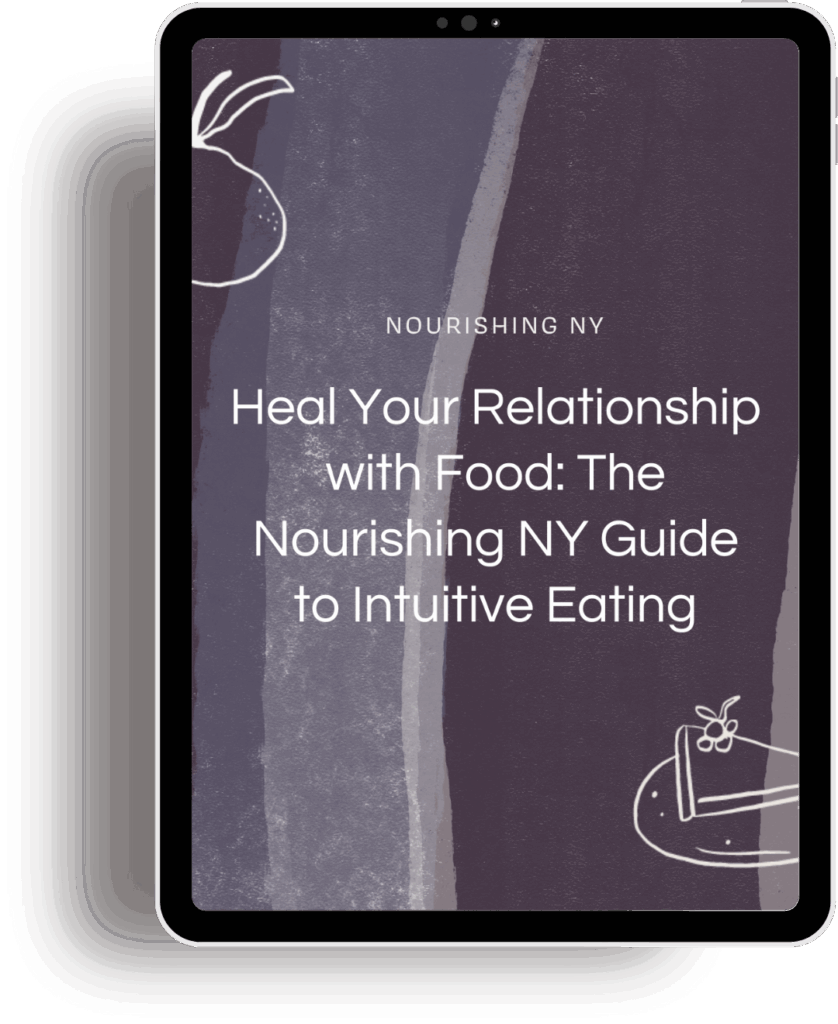Health at Every Size (HAES) is a framework that challenges the assumption that health is determined by body size. It promotes body inclusivity and pushes back against the narrative that body size is the primary indicator of health. HAES-aligned clinicians use an evidenced-based, weight-neutral approach to care to reduce weight stigma and bias. They consider all parts of one’s health, including, but not limited to, access to food and healthcare, social determinants, and mental and emotional health. Working with a HAES-aligned nutritionist can be an integral part in one’s recovery journey.
Whether you’re navigating the ever-changing messages of diet culture, rebuilding your mindset, focusing on mindfulness, or exploring your relationship with your body, finding a HAES-aligned nutritionist in NYC is key to ensuring that your health is considered from a multifaceted and inclusive perspective. The guidance and support you’ll receive from a HAES nutritionist or dietitian is one that is grounded and rooted in a scientific approach.
At Nourishing NY, our team of HAES-aligned dietitians are in-network with several insurances and are ready to offer the individualized support you deserve.
What Does a HAES Nutritionist Do?
A HAES nutritionist helps support individuals nourish their bodies, explore their relationship with food, and work on goals without focusing on weight loss. They use principles of intuitive eating and mindfulness to support reconnection to hunger, satisfaction, and satiety. They also emphasize the importance of one’s overall well-being – emotional health, physical health, support system, stress, etc – to ensure that all factors are being considered in the treatment approach. Most importantly, weight loss is not a focus of the work that you will do with a HAES nutritionist. You won’t be asked to count calories, follow diet plans, or abide by food rules. Instead, you will work collaboratively to create trust within your body and with food.
Many people who have struggled with disordered eating, body image concerns, or chronic dieting have been led to believe that weight is the most important measure of health. They’ve often been blamed for their health conditions and made to feel that their body size is the problem. Shifting this mindset is essential to healing. Building a healthier relationship with your body starts with focusing on supportive behavior changes—habits that help you feel better physically, mentally, and emotionally. For example, stepping away from fad diets, letting go of calorie counting, practicing mindfulness, and incorporating gentle movement are all meaningful ways to support your body. These behaviors not only promote well-being, but also help challenge and heal the harmful belief that your body is the problem.
Initial Consultation: What Happens First
The first appointment with a HAES dietitian is typically an intake session where your dietitian will spend time getting to know you – your lived experience and your history, not just your symptoms. This lends itself to a conversational approach and helps to mitigate any initial nerves you may have coming into the session. You’ll have a chance to talk about your relationship with your body, your typical eating patterns, your medical history, and your overall goals in working together. You will be met with support, non-judgement, and care as you navigate these questions together.
Sample intake questions may include:
- How would you describe your current relationship with food? Looking back, how has your relationship with food evolved over time?
- Do you find yourself thinking about food often?
- Are there specific foods that bring up stress, anxiety, or a sense of “shoulds” or “shouldn’ts”?
- Who are the people in your life that provide support for you? (ex: friend group, family, colleagues)?
- How would you describe your relationship with your body right now? Did it look different in the past?
- Are there medical conditions or symptoms that you are currently managing that you’d like me to be aware of?
- How accessible is food for you? This could include grocery store proximity, financial constraints, time, and/or energy.
You’ll move through this intake process at a pace that feels comfortable for you, with check-ins along the way. While it may feel vulnerable to talk through your eating history, your dietitian will approach this with gentle curiosity and non-judgement. The goal is to better understand your patterns around food (timing, hunger/fullness cues), food rules, emotions or situations that impact eating, and to best support your current nutrient needs.
You may discuss and set a few realistic and achievable goals. The goals will be based on your overall readiness and comfort level.
Sample goals might include:
- “I want to feel less anxious around food.”
- “I’d like to try eating more consistently during the day.”
- “I want to get back in touch with my hunger/fullness cues.”
- “I want to make peace with a food I’ve been avoiding.”
- “I’d like to move my body in a way that feels good—without pressure or feeling like I ‘should’.”
Ongoing Support and Sessions
Follow-up sessions with your dietitian build upon the goals you’ve set and continue to support the deeper, ongoing work of healing your relationship with food and body. Each session typically begins with a check-in to reflect on what felt helpful, what felt challenging, and any thoughts, emotions, or questions that came up since your last meeting. This helps guide the focus of the session and ensures it remains centered on your lived experience. Together, you may explore topics such as body image, eating patterns and intake, emotional responses to food, and any related struggles or wins. These sessions are designed to meet you where you are, while also offering support, insight, and space for continued growth.
You and your dietitian will work together to set ongoing goals and expand upon those initially set. HAES-aligned dietitians recognize that progress isn’t linear, and that healing your relationship with food and your body takes time, patience, and compassion. This process is collaborative, flexible, and is focused around your individual needs, recognizing that they may change throughout the course of your work together.
HAES-aligned nutritionists and dietitians utilize several tools and frameworks to best support you as you navigate your relationship with food and body. These may include practices like intuitive eating, which encourages tuning into your body’s internal cues rather than external rules; drawing more awareness to hunger and fullness cues, as well as how to respond to them; and building a collaborative meal plan that supports nourishment, consistency, and satisfaction—without rigidity. Depending on your goals, your dietitian may also reference workbook exercises to support body image work or mindful eating. Each of the tools will be adaptive to what feels most helpful in your journey.
Why Choose a HAES Nutritionist in NYC?
The fast-paced and high pressure culture of NYC can bring along a unique set of challenges, especially as it relates to food, body image, and general well-being. The ability to tune into your body can be compromised by the busy atmosphere; meal times can feel rushed or skipped altogether; long commutes can impact meal planning and time for grocery shopping; and the endless food choices can feel overwhelming.
The influences of diet culture are also amplified – through boutique fitness classes, emphasis on appearance, and pressure to keep up with fashion trends – making it exhausting to manage well-being in a sustainable way. Furthermore, the cost of living, access to food, and ease of cooking (i.e. small kitchen spaces) poses another set of challenges and barriers to consistent nourishment. This can create added stress to an already stressful and busy lifestyle. Having access to an eating disorder dietitian or HAES-aligned clinician in a city as complex and diverse as NYC can be essential.
While the numerous food choices can feel overwhelming, there is also an immense amount of cultural diversity and food traditions. A HAES-aligned dietitian acknowledges and respects these differences, understanding that wellness does not look the same for everyone and must be adapted to each person’s lived experience.
How to Find a HAES-Aligned Nutritionist
In order to start the search of finding a HAES-aligned dietitian or nutritionist, you may start with a Google search using any of the following terms:
- “HAES-aligned dietitian”
- “intuitive eating dietitian”
- “weight-inclusive care”
- “weight-inclusive dietitian”
- “Non-diet dietitian NYC”
You can also search your insurance provider’s directory to find in-network dietitians. Working with an in-network provider can significantly reduce out-of-pocket costs, lowering the financial barrier and increasing accessibility to ongoing, supportive care. This can be especially important in a high-cost city like New York, where affordability is often a key factor in sustaining long-term treatment.
When you find a provider who feels like the right fit for you, it can be helpful to ask a few questions to ensure that their approach supports your needs and values. These may include:
- What is your approach to nutrition counseling and weight-inclusive care?
- How do you support clients in healing their relationship with food and body?
- How do you incorporate intuitive eating principles and the Health at Every Size framework into your practice?
- How do you navigate disease management from a weight-inclusive approach?
- How are the sessions structured (length, frequency, etc.)?
- What are some examples of goals that we might set together?
Ultimately, what matters most is working with a dietitian that aligns with your values, goals, and respects your lived experience. Having a provider that supports, validates, and meets you without judgement can make a meaningful difference in your journey. A weight-inclusive, HAES-aligned dietitian offers compassionate and individualized care to fully support your well-being.



